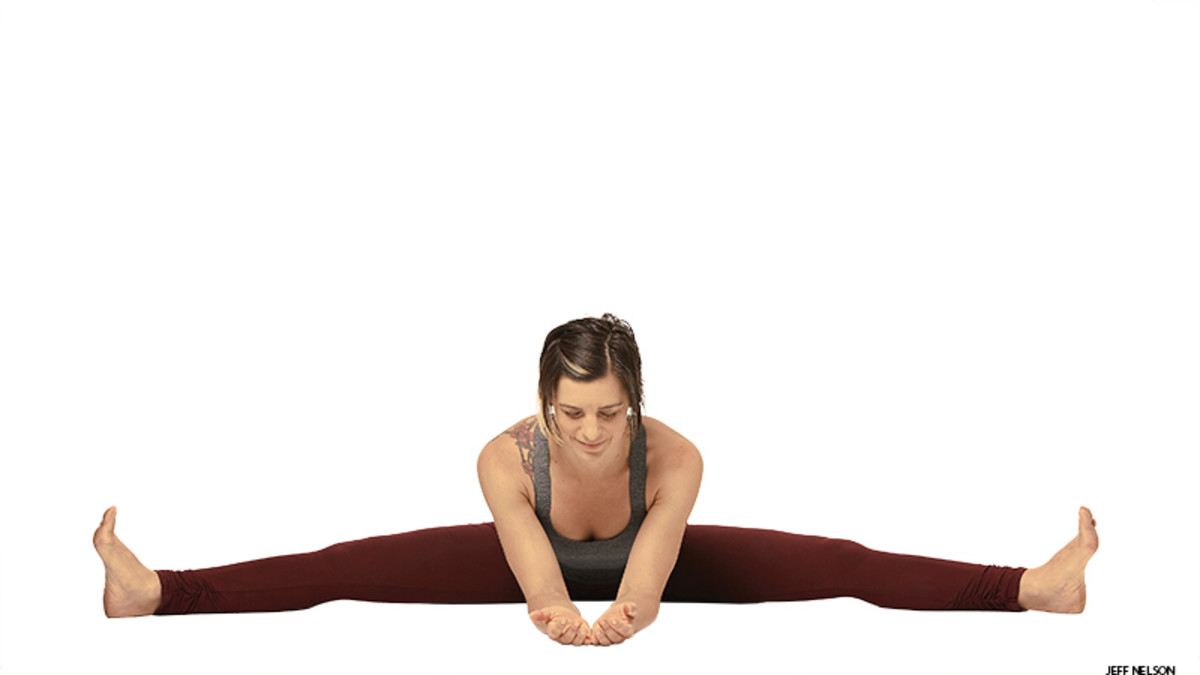
This woman has incredible range of motion in her joints. Could her hypermobility be related to other health issues, too, via a surprising compound?
Collagen is the new buzzword in wellness these days, highlighted for its foundational role in almost all of our body’s systems from cell turnover to sleep and homeostasis. Most of the time, it comes up in beauty-related conversations as the “plump factor” in youthful, glowing skin and lips. From injections to supplements to topical treatments like serums and creams, there’s a mecca of products out there to help you get this vital protein in a way that suits your needs best—including without animal products.
But did you ever think about all that collagen floating around the rest of your body that *isn’t* your face? If the compound is working hard to regulate things like hormones, you best bet that its powerhouse potential doesn’t just lie in making you beautiful. Collagen makes you (and your cells) strong, and a collagen deficiency is a common point across the wide spectrum of hypermobility (increased elastin also plays a role).
Ever had a friend in school whose elbow bent back farther than 180 degrees? Are you that friend? This is hypermobility in action. It’s a type of functional variation wherein the joints (some or all) can extend beyond their normal range of motion due to a laxity in ligaments, the connective tissue that joins bones together at joints. While it’s not particularly harmful in the day to day, engaging in activities involving deep stretching like yoga can put a hypermobile person at risk of damaging their ligaments short-term and long-term—sort of like stretching a rubber band over and over and over until it no longer stretches and one day just breaks entirely. As a hypermobile individual, I can attest to how frustrating it is to be in the “correct” expression of a yoga asana and feel nothing while everyone else is moaning in a blissful release of tension. One of my teachers once explained, while leading us into upavistha konasana (wide-legged seated forward fold), that the students in the class who were less flexible had it easier in the end because they didn’t have to go as far to “feel” the stretch.

When upavistha konasana goes wrong…
That day I kept going and going until I felt something—a pop in my groin, which was most likely the result of years of hunting for the feeling of inner thigh stretch. But that’s just my story, since hypermobility shows up differently in each person—in different joints, to different degrees, and from different causes, like the genetic condition called Ehlers-Danlos Syndrome—making it even harder to treat. Lower amounts of collagen remains a common factor though, which makes sense because if the ligaments don’t have enough of it to hold themselves (and your bones) together, then they’ll just get floppy and not be able to do their job.
The connection to collagen is worth noting, though, because of a new body of emerging research about correlations between hypermobile individuals and sufferers from a host of other “nervous” disorders like IBS, anxiety and depression, fatigue, brain fog, low blood pressure, and more. Yoga and biomechanics rockstar Jules Mitchell discusses this exciting new field of inquiry in her online course on the subject, and it’s interesting for me to draw correlations between all these things in my own body. While the science is still out, energetically I feel that a lack of underlying support in my body and life are behind many of those symptoms, but only time will tell if anything definitive can be said about collagen, hypermobility, and these related symptoms, and whether adding collagen to one’s diet can help alleviate them.
I’m excited to check out Mitchell’s forthcoming book on stretching to get better informed on the science of healthy stretching—and to get my hands on some more vegan collagen supplements to help me stretch less and feel more of the good sensations life has to offer.

Anima Mundi Plant-Based Collagen, $26

Are you hypermobile, or do you teach hypermobile students in your movement classes? Think you have collagen deficiency? Share your tips and stories!
Also by Jen: Guess What, Your Gut Affects Your Personality–& Other Facts About Your Insides
Related: Weight Loss, Collagen, Brain Boost?! Autophagy Is The New Way To Detox Sans Juice Cleanse
Vegan Bone Broth Alternative (Collagen-Boosting Veggie Plate)
Get more like this—Subscribe to our daily inspirational newsletter for exclusive content!
__
Photos: Max Rovensky on Unsplash, Yoga Journal, Adobe Stock, Thrive Market




